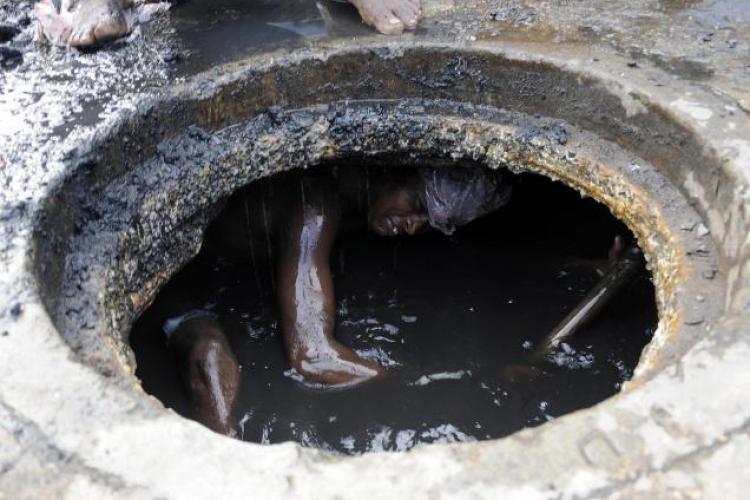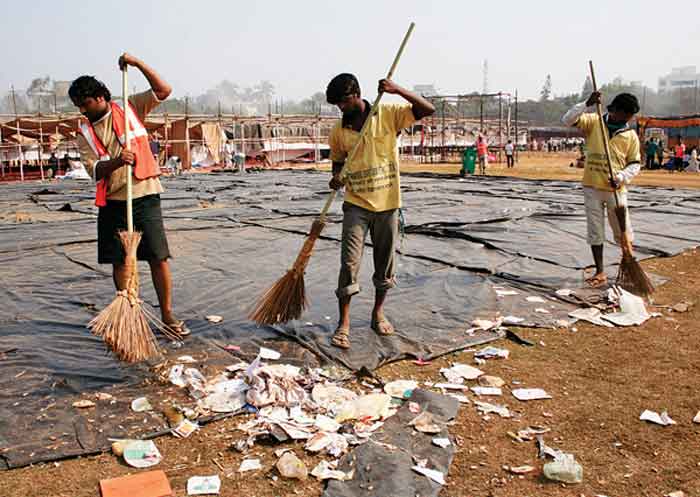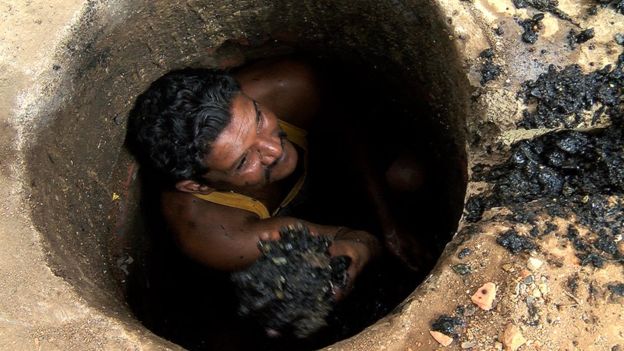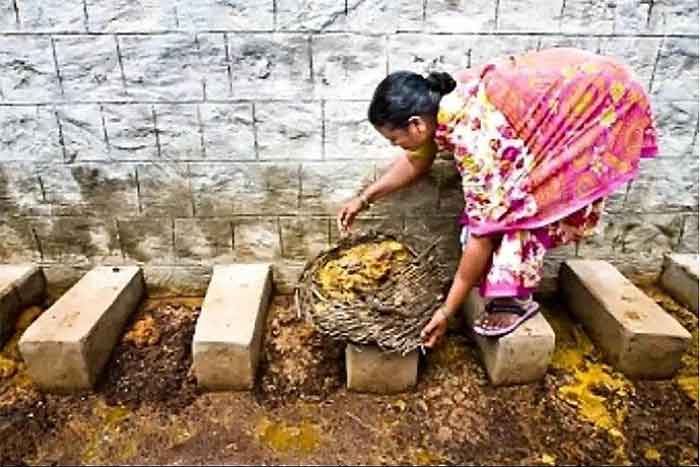
The basic need of people accommodate food, clothing and shelter. These three are important for the existence and survival of human beings, but presently, survival is not the only segment which the human beings look at. The aspects like dignity, self respect, freedom, justice also plays a very crucial role in leading a respectful and meaningful life. By this analyses, the work done by the manual scavengers, might help them in generating very minimal amount of money, but the discrimination faced by them forces them to remain in the same position. This amalgamation of economic, social, political exclusion not only restricts them to have a better standard of living, but also violates their fundamental as well as human rights.
In India, caste plays a major role in determining the work and dignity of the individual. Caste did not effect the individual at later stages of life, but since the first cry of the child in this world. There are many sections in the society which are marginalized politically, socially, economically, psychologically. In India, this discriminatory sections particularly include women, dalits, minorities, and adivasis. Some of these are restricted to a particular area and the profession, for eg: The work of manual scavenging engages people who are of dalit identity.
Manual Scavenger is defined as “a person engaged in or employed for manually carrying human excreta”. The history of manual savanging goes back to the time of british rule in India when municipalities were constituted. The use of containers in toilets were prominent, that needed to be emptied daily. After the discovery of flush toilets, this practise vanished from the western world, but left its footprints in developing countries like India[i]
Legal vs Practise
Legally, manual scavenging is banned, caste apartheid and poverty perpetuate this practise. Where we are building up our economy and is known for being the largest democracy the practise of manual scavenging is still prevalent. Constitution and constitutional bodies promises to preserve and protect the rights of the Indian citizens, these promises are very elegantly written but sometimes fails to deliver with same elegance. India as a country is advancing in various segments like technology, economy, society etc. but still accommodates practices which directly poses threat to the life of the individual like practise of manual scavenging.
Employment of manual scavengers and construction of dry latrins act (1993), under this act manual scavenging is prohibited in India and construction of insanitary latrins should not takes place, manual cleaning of sewers without protected gears is also prohibited. In the same year, the body named National Commission for Safai Karamchari was established in order to coordinate all the aspects related to prohibition of manual scavenging. Also, study various schemes and make recommendations related to the same.
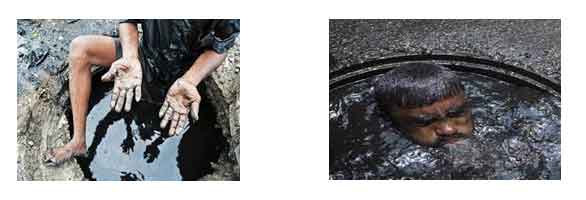
In 2013, The Prohibition of Employment as Manual Scavengers and their Rehabilitation Act was passed which made it mandatory for municipalities, cantonment boards and railway authorities to construct adequate number of sanitary community latrines within three years of this act coming into force. This act also brought the factor of penalization, if a person employs a manual scavenger or construct insanitary latrine, shall be obligated to pay fine up to Rs. 50,000 or face imprisonment of up to 1 year or both. This act is not limited to individuals but also includes local authorities or agencies where the hiring is prohibited for hazardous cleaning i.e. without protective gear and other safety precautions. And the penalty goes up to 2 years of imprisonment or fine up to 2 lakh or both[ii].
The Hindu in 2019, reported that “814 deaths of manual scavengers engaged in cleaning sewers and septic tanks have been recorded in India from 1993 to July 2019 in 20 States and UTs. Of these 20 States, details of compensation received by the family of the deceased is available for only 11 States”. The lack of data becomes a major restricting factors in today’s world where every decision is influenced by data directly or indirectly. This factor of unavailability or lack of data works as a shield for government and barred them from being accountable. The same can be witnessed through the recent declaration by the government in the Parliament, whereby “no deaths due to manual scavenging per se were reported in the country; however, 941 deaths were reported while the cleaning of sewer/septic tanks”[iii].
Conclusion and Recommendations
As, the world is changing at a faster pace, there is an need to eliminate such inhumane practices and live up to the expectations of our constitution makers. Fundamental rights enshrined in the constitution and legal safeguards for the protection of individuals becomes null and void if the execution is weak. Recently, there are initiatives taken by various ministries to help manual scavengers in coming out of such grave, like the formation of an “Action Plan” prepared by the ministry of Social Justice and Empowerment for the year 2020-2021. These plans include steps like Capital Subsidy for Self Employment Projects, Skill Development Training, Health-cum-awareness camps etc. Even after the initiatives by government and various organization these practices are highly prevalent and the people involved face all types of discrimination and challenges to overcome the atrocities.
The challenges involved are multi dimensional like caste based discrimination, social beliefs and stigmas, lack of technology advancement, lack of awareness, labour rights, lack of data or unclear data etc. Therefore, the ways for combating this issue should also be multifaceted. It can involve various stakeholders like government, Non-profit organizations, individual volunteers to spread across the awareness regarding the problems faced by these communities. Along with the awareness, there is a need to awaken the empathetic attitude of the people towards the affected population which can help in reducing the social stigmas attached to it. The Non-profit organizations can also help the government in generating data, so that the accountability of the government remains on ground. The country should build up robots and the relative technological tools to reduce the need of manual labour.
In the end, the effective implementation of the existing policies and advancement in those policies according to the need of an hour should be taken care of. Hence, these deep rooted problems cannot be solved by the action of one individual or one sector, it can only be developed with the acceptance attitude of general public and providing alternatives by different stakeholders to the affected population.
- Manual scavenging as social exclusion: A case study. Economic and Political (2020, April 24). https://www.epw.in/journal/2009/26-27/notes/manual-scavenging-social-exclusion-case-study.html
- Public policies on manual scavenging: A case study of india. (n.d.). Retrieved September 2022, from https://www.iipa.org.in/cms/public/uploads/159961652179097.pdf
- The Hindu. (2019, September 25). 54,130 manual scavengers have been identified in 18 states in India. Return to frontpage. Retrieved September 2022, from https://www.thehindu.com/data/manual-scavenging-exists-in-india-despite-being-outlawed-in-2013/article29508476.ece
Arpita Paliya is a Political Science, masters graduate.

